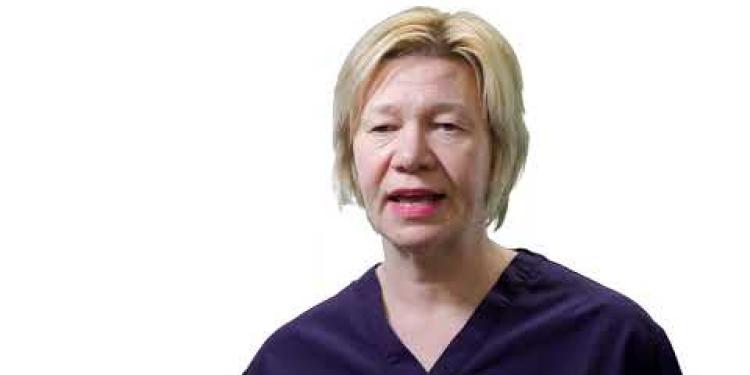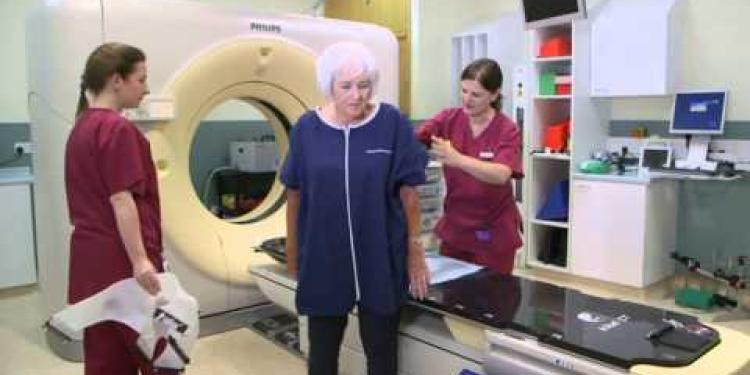Important Information On Using This Service
- Ergsy carefully checks the information in the videos we provide here.
- Videos shown by YouTube after a video has completed have NOT been reviewed by ERGSY.
- To view, click the arrow in the center of the video.
Using Subtitles and Closed Captions
- Most of the videos you find here will have subtitles and/or closed captions available.
- You may need to turn these on and choose your preferred language.
Turn Captions On or Off
- Go to the video you'd like to watch.
- If closed captions (CC) are available, settings will be visible on the bottom right of the video player.
- To turn on captions, click settings.
- To turn off captions, click settings again.
Find A Professional
About head and neck cancer
Head and neck cancer refers to cancers that develop in the tissues and organs of the head and neck region. This includes the oral cavity (mouth), throat (pharynx), voice box (larynx), nasal cavity, sinuses, and salivary glands. These cancers can arise from various types of cells, including squamous cells, which line the inside of the head and neck.
Risk factors for head and neck cancer include tobacco and alcohol use, human papillomavirus (HPV) infection, exposure to certain chemicals or toxins, poor oral hygiene, and a diet lacking in fruits and vegetables.
Symptoms of head and neck cancer may include:
- Persistent sore throat
- Difficulty swallowing
- Lump or swelling in the neck
- Hoarseness or changes in voice
- Ear pain
- Persistent nasal congestion or sinus pressure
- Chronic cough
- Unexplained weight loss
- Oral lesions or sores that don't heal
- Difficulty breathing
Diagnosis of head and neck cancer
Diagnosis typically involves a physical examination, imaging tests such as CT scans or MRIs, and biopsy to confirm the presence of cancerous cells.
Treatment of head and neck cancer
Treatment for head and neck cancer depends on various factors including the type and stage of the cancer, as well as the patient's overall health and preferences. Treatment options may include surgery, radiation therapy, chemotherapy, targeted therapy, or a combination of these approaches. Additionally, supportive care such as speech therapy or nutritional support may be incorporated into the treatment plan to help manage side effects and improve quality of life.
Early detection and treatment can improve outcomes for individuals with head and neck cancer. It's important to seek medical attention promptly if you experience any symptoms or risk factors associated with this type of cancer. Additionally, regular dental check-ups and screenings can aid in the early detection of oral cancers.
Head and Neck Cancer Diagnosis
Introduction to Head and Neck Cancer
Head and neck cancer encompasses a variety of malignant tumours that develop in or around the throat, larynx, nose, sinuses, and mouth. The occurrence of these cancers can be influenced by factors such as tobacco use, alcohol consumption, and human papillomavirus (HPV) infection. Early detection and diagnosis are critical for effective treatment and improved survival rates.Primary Symptoms and Signs
Common symptoms of head and neck cancer can include a persistent sore throat, difficulty swallowing, unexplained weight loss, changes to the voice or hoarseness, lumps in the neck, and persistent ear pain. Not all symptoms indicate cancer; however, it is essential to seek medical advice if these symptoms persist. Timely consultation with a healthcare professional can lead to early diagnosis, which significantly impacts treatment outcomes.Diagnostic Procedures
The diagnostic process typically begins with a detailed medical history and physical examination. If head and neck cancer is suspected, various diagnostic tests may be employed: - Endoscopy: A flexible tube with a light and camera, called an endoscope, is used to examine areas within the head and neck. - Imaging Tests: Techniques such as CT scans, MRIs, and PET scans provide detailed images of internal structures and help in assessing the extent of the tumour. - Biopsy: A sample of suspicious tissue is surgically removed and examined under a microscope to confirm the presence of cancer cells.Specialist Consultation and Multidisciplinary Team Approach
In the UK, patients diagnosed with head and neck cancer are typically referred to a multidisciplinary team (MDT) of specialists. This team can include surgeons, oncologists, radiologists, pathologists, dietitians, and speech therapists. The MDT collaborates to develop a comprehensive treatment plan tailored for each patient. Regular meetings ensure coordinated care, and patients benefit from the expertise of various healthcare professionals.Importance of Early Detection and Regular Screening
Early detection is crucial for improving prognosis and survival rates. In the United Kingdom, awareness campaigns and regular screening initiatives aim to educate the public on the importance of recognizing early signs of head and neck cancer. For high-risk individuals, such as smokers and heavy drinkers, regular screenings and prompt evaluation of symptoms are vital. Early-stage cancers are usually more treatable and often associated with better health outcomes.Conclusion
Head and neck cancer diagnosis involves a combination of symptom evaluation, advanced imaging techniques, and biopsy procedures. In the UK, a multidisciplinary team approach ensures patients receive comprehensive and effective care. Awareness and regular screenings play a crucial role in early detection, opening the door to more successful treatments and improved survival rates. Seeking timely medical attention can make a significant difference in combating head and neck cancer.Frequently Asked Questions
What are the common symptoms of head and neck cancer?
Common symptoms include a lump or sore that doesn't heal, persistent sore throat, difficulty swallowing, and changes in your voice. If you experience any of these symptoms, it is recommended to consult with a healthcare professional.
How is head and neck cancer diagnosed?
Diagnosis typically involves a physical examination, imaging tests like CT or MRI scans, and tissue biopsy to confirm the presence of cancer cells.
What are the risk factors for head and neck cancer?
Risk factors include tobacco use, excessive alcohol consumption, human papillomavirus (HPV) infection, poor oral hygiene, and exposure to certain environmental toxins.
Can head and neck cancer be prevented?
While not all cases can be prevented, reducing risk factors such as quitting smoking, limiting alcohol use, maintaining good oral hygiene, and getting vaccinated against HPV can lower your risk.
What types of treatments are available for head and neck cancer?
Treatment options include surgery, radiation therapy, chemotherapy, targeted therapy, or a combination of these depending on the cancer stage and location.
Is head and neck cancer hereditary?
Most head and neck cancers are not hereditary, but having a family history of cancer can increase your risk. Genetic counseling may be recommended if you have a significant family history.
What is the role of HPV in head and neck cancer?
HPV, particularly HPV-16, is a significant risk factor for oropharyngeal cancer, which affects parts of the throat, tongue, and tonsils. Vaccination against HPV can help reduce this risk.
What should I do if I suspect I have symptoms of head and neck cancer?
If you experience symptoms like a persistent lump, sore throat, or voice changes, contact your GP for a referral to a specialist for further evaluation.
What are the stages of head and neck cancer?
Head and neck cancers are typically staged from I (localized) to IV (advanced spread). Staging helps determine the most appropriate treatment plan.
Can head and neck cancer be curable?
The curability of head and neck cancer depends on the type, location, and stage at diagnosis. Early-stage cancers have better prognosis and higher chances of cure.
Are there any clinical trials available for head and neck cancer patients in the UK?
Yes, clinical trials are available and can offer access to new treatments. Speak to your oncologist about ongoing clinical trials that may be suitable for you.
What lifestyle changes can help support treatment for head and neck cancer?
Adopting a healthy lifestyle by quitting smoking, reducing alcohol intake, eating a balanced diet, and maintaining oral hygiene can support your treatment and overall well-being.
How does radiation therapy work for head and neck cancer?
Radiation therapy uses high-energy beams to target and kill cancer cells in the affected area. It's commonly used post-surgery to eliminate any remaining cancer cells.
What is the recovery process like after head and neck cancer treatment?
Recovery varies depending on the treatment. It may involve rehabilitation, physical therapy, speech therapy, and regular follow-up visits to monitor for recurrence and manage side effects.
Where can I find support and resources for head and neck cancer patients in the UK?
Support groups, counseling services, and patient resources are available through organizations like Cancer Research UK, Macmillan Cancer Support, and local NHS services.
Useful Links
Useful links from: Royal Berkshire NHS Foundation Trust: Radiotherapy for head and neck cancers
- Royal Berkshire NHS Foundation Trust - Radiotherapy Information about radiotherapy services provided by the Royal Berkshire NHS Foundation Trust, including treatments for head and neck cancers.
- NHS - Radiotherapy Overview of radiotherapy, how it works, what to expect during treatment, and its uses specifically for head and neck cancers provided by the NHS.
- Macmillan Cancer Support - Head and Neck Cancer Support and information from Macmillan Cancer Support for patients with head and neck cancers, including radiotherapy treatments and managing side effects.
- Cancer Research UK - Radiotherapy for Head and Neck Cancers Detailed information from Cancer Research UK about radiotherapy as a treatment option for head and neck cancers, including preparation, procedure, and recovery.
Useful links from: Radiotherapy to the Head and Neck: A Guide for patients and their carers
- NHS - Radiotherapy Official NHS page providing detailed information about radiotherapy, including what it is, how it works, potential side effects, and what to expect during the treatment process.
- Macmillan Cancer Support - Head and Neck Radiotherapy Comprehensive guide by Macmillan Cancer Support on radiotherapy for head and neck cancers, including preparation, treatment process, side effects, and support resources.
- Cancer Research UK - Radiotherapy for Head and Neck Cancer Detailed information from Cancer Research UK about radiotherapy treatment for head and neck cancer, including the process, side effects, and aftercare.
- Marie Curie - Radiotherapy Resource from Marie Curie offering an overview of radiotherapy, including what to expect, how to cope with side effects, and support available for patients and their carers.
Have you found an error, or do you have a link or some information you would like to share? Please let us know using the form below.
- Ergsy carfully checks the information in the videos we provide here.
- Videos shown by Youtube after a video has completed, have NOT been reviewed by ERGSY.
- To view, click the arrow in centre of video.
- Most of the videos you find here will have subtitles and/or closed captions available.
- You may need to turn these on, and choose your preferred language.
- Go to the video you'd like to watch.
- If closed captions (CC) are available, settings will be visible on the bottom right of the video player.
- To turn on Captions, click settings .
- To turn off Captions, click settings again.



